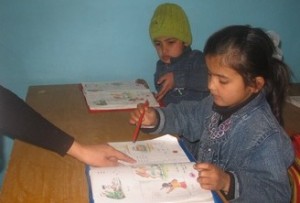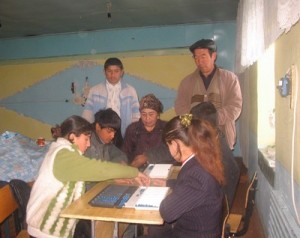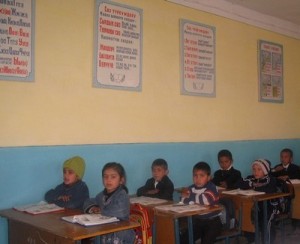OSH, Kyrgyzstan | “I want to be a doctor,” declares Nafisa, an eighth-grader at School No. 105 in the suburbs of Kyrgyzstan’s second-largest city. “My friend Aziza wants to be a teacher.”
But Nafisa’s next comment reveals the gap between ambition and reality at this school attended entirely by members of Kyrgyzstan’s tiny Lyuli minority: “I wish we had a library.”

A young girl studies Kyrgyz at School No. 105. The Lyuli students receive no instruction in their native language, which more closely resembles Tajik. Photo by Hamid Toursunof.
The lack of a library may be the least of problems for the 320 students at this school in the Jangi-Kyshtak (New Village) settlement, home to about 3,300 Lyuli in the Kara-suu district of Osh province. The shabby one-story building has no heating system; students wear coats and caps in November and December, then take an enforced vacation from January into March. The worn furniture is decades old, and Soviet-era posters decorate the walls. Teachers use twigs instead of pointers. At School No. 105, time seems to have stopped in the 1970s.
At this all-Lyuli school, there are no teachers of ethnic Lyuli origin. Nor are there teachers of English or Russian. There are no textbooks or other written learning materials in their language, which Fatima Toichieva, the principal, described as “Tajik mixed with a specific vocabulary used only by the community.”
For most of the students, this is the only education they will get. The settlement has no high school, and linguistic and social isolation leave School 105’s pupils ill-suited to continue their studies with their Kyrgyz and ethnic Uzbek peers. Like their parents and grandparents, they’ll likely stay segregated in Jangi-Kyshtak.
Students and teachers play the Kyrgyz board game toguz korgool. Inadequate heating forces them to bundle up when the weather turns cold.
Uncertain Past, Uncertain Future
The history of the Lyuli remains an open question. They are often linked ethnically to Roma – many scholars say they share similar roots in India – but unlike the majority of European Roma they practice Islam. Abdurashid Urinov, Jangi-Kyshtak’s community leader, maintains Lyuli are of Persian origin, more closely related to modern Tajiks.
On the origins of their ghetto community, there is no dispute.
“The Soviet authorities allocated plots on the outskirts of Osh for the first 20 to 25 Lyuli families at the end of the 1950s and forced them to live there,” said Adyljan Obidov, an education expert and analyst for the Civil Initiatives Support Center, an Osh-based NGO. “All primary schools in that part of the city were Uzbek-language schools, so the first-grade class for Lyuli children was opened at the nearest Uzbek-language school. Since that time they have been taught in the Uzbek language.”

Students and teachers play the Kyrgyz board game toguz korgool. Inadequate heating forces them to bundle up when the weather turns cold. Photo by Hamid Toursunof.
Traditionally a closed and clannish society, the Lyuli maintained this isolation during the Soviet era. Arsen Ambaryan, head of the Osh civil association Nashi Prava (Our Rights), which has done the most extensive studies of the community, characterized it as a “no-war-no-peace situation – you don’t touch me and I won’t touch you.”
“This situation existed in the Soviet era, and since Kyrgyzstan gained independence in the 1990s, nothing has changed,” he said. “There is little understanding that segregated education based on ethnicity is a Soviet legacy, and one of the reasons why there is no process of integration of this community into Kyrgyz society.”
Even today, Lyuli rarely venture outside Jangi-Kyshtak, and people from surrounding areas rarely venture in, considering it a hotbed of begging and petty crime. Unemployment in the settlement is nearly 90 percent, according to a 2005 Nashi Prava report, and almost half of Lyuli children lack birth certificates and thus can’t claim government benefits.
“Neither the Kyrgyz authorities nor Kyrgyz society want to bother themselves addressing our issues. We live here as if we did not exist,” Urinov said bitterly. “Our community members don’t have a good education, so we cannot get good jobs. And without good jobs we cannot provide good education for our children, we cannot take them to better schools. And higher education is not free anymore, anyway. There is little we can do to change the situation.”
School No. 105 principal Toichieva, who is of Uzbek origin, said parents in Jangi-Kyshtak “have started to realize that a good education will open doors for their children to become valuable citizens,” but the hurdles are high.
“There are no Lyuli teachers or doctors, translators or engineers. I want to be a teacher, but I am not sure if my parents can afford to pay for my studies at a university,” Nafisa said. “My parents have casual jobs, which is enough only to survive.”
Language of Learning
Money is not the only obstacle. Obidov, the education expert, said neither the Soviet authorities nor their Kyrgyz successors have made any serious attempt to provide instruction in Tajik, the language closest to the Lyuli dialect.
“Until recently, the only language of instruction [in the school] was Uzbek. Recently we opened a pilot group in which we teach in the state [Kyrgyz] language,” teacher Gulnara Abylova said. As a result, she said, “Lyuli children experience difficulties while learning their lessons. They have to translate from Kyrgyz and Uzbek in order to understand this or that learning material.”
“I have never seen a single book in our language,” eighth-grader Aziza said. “We don’t have books at home except schoolbooks in Uzbek and Kyrgyz.” Books for university students are frequently in Russian, “and we don’t speak or read Russian at all,” she added.
Toichieva said the students have a hard time moving on to mainstream high schools, due to both the language barrier and the stigma attached to their ethnicity and poor primary education.
“Our children, leaving our school, don’t want to go to Uzbek or Kyrgyz high schools, where they are treated badly and often beaten by other teenagers,” she said. “We need an appropriate high school. Otherwise how can children from our school become doctors, teachers, or judges if they are deprived of proper education?”
The principal recalled a visit to the school two years ago by then-Kyrgyz Ombudsman Tursunbai Bakir uulu, who presented School No. 105 with 10 computers. Afterward he appealed to education officials to open a Lyuli high school, but the call went unheeded. Two years on, the computers remain unused. Toichieva said the school lacks a teacher with sufficient IT skills to train the students.
Kara-suu district education chief Rakhmon Nazarov said the district is in the process of building other local schools but “we will try to get funds for construction of a new high school for the Lyuli community in 2011.” In the meantime, he said Lyuli who want to continue their education past eighth grade can study at a nearby Uzbek-language school.
Nazarov cited signs of progress for Lyuli schooling, such as the program for Kyrgyz-language instruction, which he said is favored by the community’s parents. He added that three Lyuli students “are being trained at Osh Pedagogic College, and we hope they will come back to their school as teachers.”
But such optimism does not yet appear to be filtering down to School No. 105.
“All my schoolmates are Lyuli like me. We have no Uzbeks, Russians, or Kyrgyz in our neighborhood and school,” Aziza said. “I guess we don’t have much knowledge and we can’t pass our exams if we want to study at a university. … So, I don’t know if I will ever have a chance to become a doctor or a nurse. Time will tell.”
For more photos related to this article, see the Cold Classrooms album on TOL’s Flickr page.
Tags: Minorities

